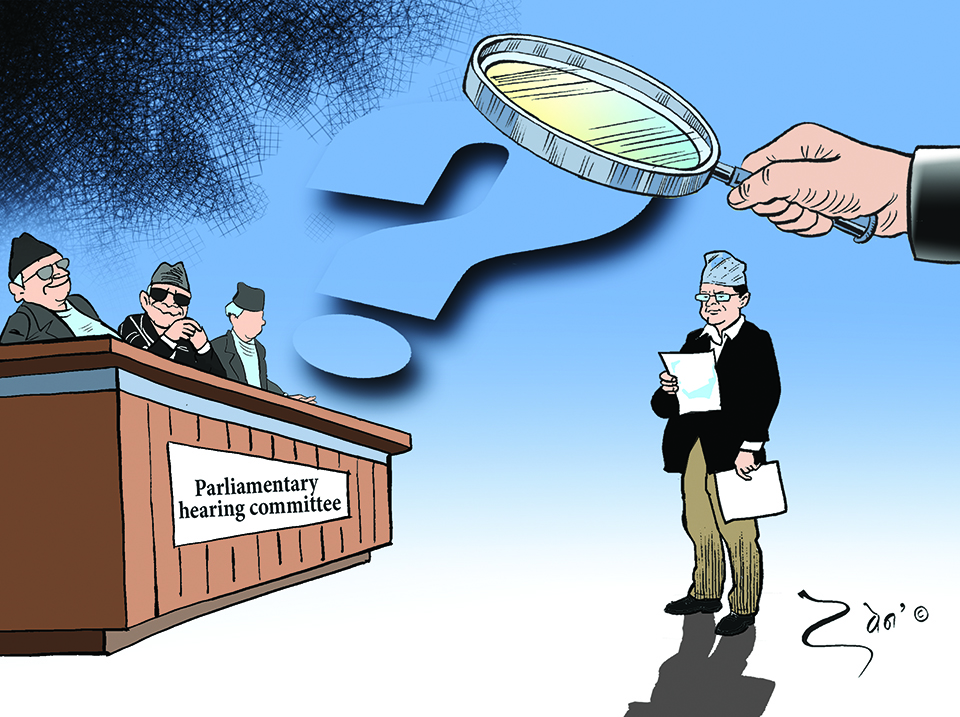
OR
Away with hearing system
Published On: December 24, 2018 01:00 AM NPT By: Arzoo Karki and Sagar Baral

More from Author
Our parliamentary hearing system has not become anything more than a ritual. We need to do away with it through constitution amendment
Article 292 of our constitution prescribes mandatory parliamentary hearings for appointment of Chief Justice and judges at the Supreme Court. The same constitution has also stated that judiciary shall function independently, free from any sort of interventions. This has also been enshrined the United Nations Basic Principles on Independence of Judiciary (1985). Thus the concept of parliamentary hearing appears to be against principle of independence of judiciary embraced by Preamble of the constitution. Our governance system makes it more so.
Parliament of Nepal is not like the one under presidential system. It is not like Senate of the US, where the president nominates judicial appointments within his/her discretion and forwards the message to the Senate. The Senate Special Judiciary Committee, then, commences the deliberation of nominees by assembling their information, ranging from candidate’s “completion of assignment in time in law schools” to his/her “professional behavior.” The nomination of federal judges is subject to a committee hearing.
It is evident that parliamentary committee can uphold constitutional supremacy by ensuring a limitation over the government and empowering people. However, pragmatically, the judiciary falling under this purview strictly appears to be against the principle of separation of powers. In parliamentary form of governance, there is strong political allegiance and pervasive whip system. Lawmakers must follow party orders. Thus if a judge gives the verdict against party cadres or rules against government policy, s/he may be harassed by the parliamentarians.
Fraught with flaws
The operating modality of our hearing committee is guided by negative system. Unless a nominee is rejected by two-thirds majority of total number of committee members, the recommended nominee is considered approved by the hearing committee. With this negative voting system, the only person so far rejected from parliamentary hearing is Justice Deepak Raj Joshi. Parliamentary hearing exercise is fraught with problems.
Prime Minister in our country is elected by the parliamentarians and he appoints ministers according to his discretion. Article 71 of the constitution mentions that Prime Minister and ministers shall be collectively responsible to the Federal Parliament, and Ministers shall be individually responsible to Prime Minister and Federal Parliament. Government is accountable to the parliament in everything. It is the government which controls the parliament in normal times. The relationship between the government and the parliament is often symbiotic. Thus these two institutions may have the same agenda and may reject the judges. This might directly or indirectly create a judicial deadlock in the state. As a result, the judiciary (the guardian of the fundamental rights) cannot function properly.
As a matter of truth, our parliamentary hearing system has sabotaged independent judiciary, one of the important components of constitutionalism.
Nepali republic is at its nascent stage. We are yet to develop proper political and legal culture. There have been instances of judges being asked irrelevant questions during parliamentary hearing. During the parliamentary hearing of Gopal Parajuli, for example, the most controversial issues regarding his academic qualification and birth certificate were never raised. Rather parliamentarians asked him about his marriage. He was grilled for being a ‘polygamist’ and had to explain that his wife had died of cancer. The situation was similar in case of Justice Damodar Sharma. One committee member made a highly personal attack against him. “Jogi banke danka dala,” implying though he sported a beard like a hermit, he amassed wealth illegally. The hearing committee rarely questioned the candidates as how they will deal with increasing legal cases or how they will ensure judicial independence.
The parliamentary committee has also been entrusted with the responsibility of conducting proper investigation of complaints filed against judges during their appointment process. Although the complaint regarding birth date in citizenship certificate and academic qualification was filed, parliamentary committee made no investigation on it. A parliamentary hearing done for mere formality does not uphold independence of judiciary.
American political philosopher John Rawls argues that when personal or group interests govern decisions fairness is grossly neglected. In Nepal, it is apparent that political parties have expectation and interest from the judiciary. Parliamentary hearing thus makes judges accountable to the political parties which also raises the probability of judges becoming party cadres. We have the precedent of judges going to party headquarters to thank leaders right after being sworn in as judges.
Finding alternative
Judicial Council was created to address all the issues involving appointments, transfers and disciplinary action of judges. Prior to this, the power was, directly or indirectly, handled by the government, which accordingly ended up raising many questions about independence of the judiciary.
This is why, during the 1990s, an autonomous body was created, whereby the judiciary was given enough power to handle all the aforementioned issues but was subject to authorization by other stakeholders and the Law Minister who represented the government. The idea was to let Chief Justice (CJ) exercise all powers regarding the appointment of the judges and taking disciplinary action against them but CJ would have to consult with the Law Minister and other members of Judicial Council (JC) before doing so. Once the Council started working, it delivered well.
But as prejudiced politics had its sway, the JC became a mere instrument used by its members to appoint and transfer judges as per their wishes. However, rather than empowering the JC or perhaps creating such other institutions for making the appointment process more transparent and upholding the independence of judiciary, Parliament is more focused on overturning the entire appointment process. This will only produce some venal judges who work as per the instruction of the government.
The best alternative would be assigning the parliamentarians the role of providing guidance to the Judicial Council regarding the principles it needs to follow while appointing judges. This goes in line with parliamentary system and also promotes judicial independence. It also makes JC more alert about appointing competent, skilled and qualified judges.
The hearing system has not become anything more than a ritual. We need to do away with it through constitution amendment.
The authors are students at Kathmandu School of Law
You May Like This

Assessing media attack
When public figures indulge in media attacks, the prospects and conditions for the media grow dimmer and dangerous by the... Read More...

Case for clean feed policy
Finance Minister Yubaraj Khatiwada should coordinate with Ministry of Information and Communication to immediately implement clean feed policy ... Read More...

At the heart of jungle
Chitwan is the place of nature, culture and adventure. There is something here for everyone making it the prime destination... Read More...



Just In
- World Malaria Day: Foreign returnees more susceptible to the vector-borne disease
- MoEST seeks EC’s help in identifying teachers linked to political parties
- 70 community and national forests affected by fire in Parbat till Wednesday
- NEPSE loses 3.24 points, while daily turnover inclines to Rs 2.36 billion
- Pak Embassy awards scholarships to 180 Nepali students
- President Paudel approves mobilization of army personnel for by-elections security
- Bhajang and Ilam by-elections: 69 polling stations classified as ‘highly sensitive’
- Karnali CM Kandel secures vote of confidence
















Leave A Comment